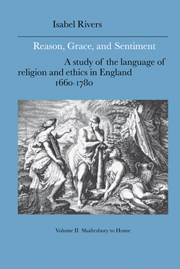Book contents
- Frontmatter
- Contents
- Preface
- Abbreviations
- Introduction
- 1 The true religion of nature: the freethinkers and their opponents
- 2 Shaftesbury and the defence of natural affection
- 3 Defining the moral faculty: Hutcheson, Butler, and Price
- 4 The ethics of sentiment and the religious hypothesis: Hume and his critics
- 5 The conflict of languages in the later eighteenth century
- Bibliography
- Index
4 - The ethics of sentiment and the religious hypothesis: Hume and his critics
Published online by Cambridge University Press: 15 December 2009
- Frontmatter
- Contents
- Preface
- Abbreviations
- Introduction
- 1 The true religion of nature: the freethinkers and their opponents
- 2 Shaftesbury and the defence of natural affection
- 3 Defining the moral faculty: Hutcheson, Butler, and Price
- 4 The ethics of sentiment and the religious hypothesis: Hume and his critics
- 5 The conflict of languages in the later eighteenth century
- Bibliography
- Index
Summary
I wish from my Heart, I coud avoid concluding, that since Morality, according to your Opinion as well as mine, is determin'd merely by Sentiment, it regards only human Nature & human Life. This has been often urg'd against you, & the Consequences are very momentous.
Hume to Hutcheson (1740)All the philosophy … in the world, and all the religion, which is nothing but a species of philosophy, will never be able to carry us beyond the usual course of experience, or give us measures of conduct and behaviour different from those which are furnished by reflections on common life. No new fact can ever be inferred from the religious hypothesis; no event foreseen or foretold; no reward or punishment expected or dreaded, beyond what is already known by practice and observation.
Hume, Enquiry concerning Human UnderstandingWhat Danger can ever come from ingenious Reasoning & Enquiry? The worst speculative Sceptic ever I knew, was a much better man than the best superstitious Devotee & Bigot.
Hume to Gilbert Elliot (1751)Where the moral sense is entire, there must be a sense of religion; and if a man who has no sense of religion live decently in society, he is more indebted for his conduct to good temper than to sound morals.
Kames, Sketches of the History of Man (1774)The enemies of Religion are awake; let not her friends sleep.
Horne, Letter to Adam Smith (1777)- Type
- Chapter
- Information
- Reason, Grace, and SentimentA Study of the Language of Religion and Ethics in England, 1660–1780, pp. 238 - 329Publisher: Cambridge University PressPrint publication year: 2000

